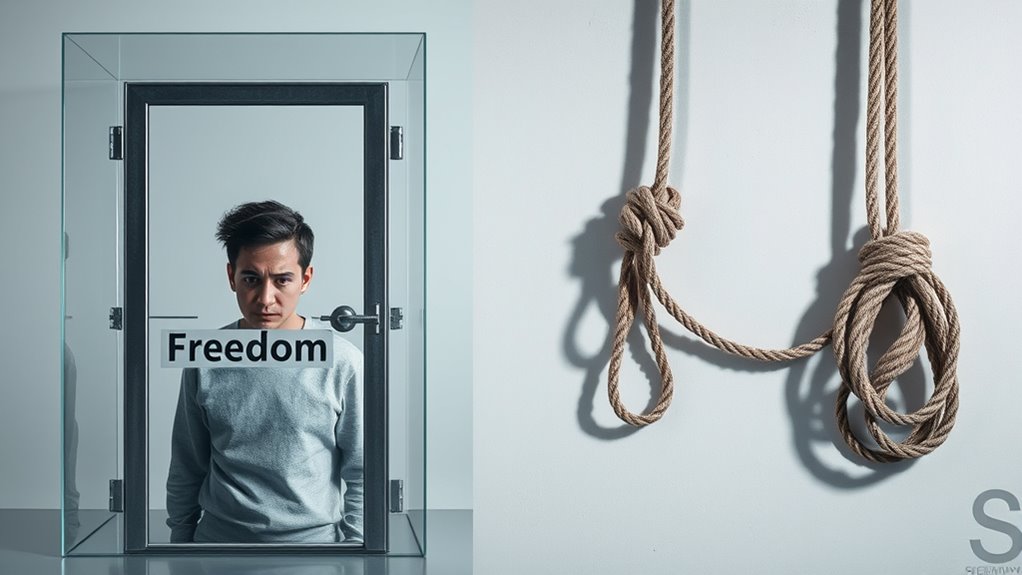The double bind phenomenon puts you in no-win choices, creating stress and limiting your control. When faced with conflicting expectations—like needing to assert yourself while also being compliant—you might feel trapped. This pressure can lead to anxiety and burnout. Recognizing these patterns is essential for developing coping strategies. With the right tools and insights, you can navigate these challenges better and enhance your mental well-being. There’s much more to explore on how to manage these conflicts effectively.
Key Takeaways
- Double binds create no-win choices that can lead to feelings of helplessness and increased mental strain.
- Conflicting expectations from various sources contribute to decision-making paralysis and emotional distress.
- Recognizing double bind patterns is essential for developing effective coping strategies and improving mental health.
- Setting boundaries and fostering open dialogue can help navigate double binds in personal relationships and workplace dynamics.
- Engaging in family support and healthy lifestyle choices can enhance decision-making clarity in no-win situations.
Understanding the Double Bind Phenomenon

When you encounter a double bind, it often feels like you’re stuck between a rock and a hard place, facing choices that seem to lead to negative outcomes no matter what you decide. This phenomenon arises from paradoxical communication, where messages conflict, leaving you unsure of how to respond. You might feel pressured to meet conflicting expectations from different people or situations, which only complicates your decision-making. For instance, you may be told to assert yourself yet also encouraged to be accommodating. These contradictions can create a sense of helplessness, as you struggle to navigate your responsibilities while trying to satisfy everyone involved. Understanding this dynamic is essential for recognizing the limitations it places on your choices and finding ways to cope effectively. Incorporating stress management techniques can help alleviate the feelings of anxiety associated with these no-win situations. Additionally, recognizing the impact of lactose intolerance may provide insight into personal choices that affect well-being in social settings involving food. Moreover, the concept of color accuracy plays a crucial role in ensuring that visual content is presented in a way that aligns with viewers’ expectations, adding another layer of complexity to decision-making. Furthermore, understanding user consent management can empower you to take control of your data, which may alleviate some stress in navigating social interactions. Choosing a name for your dog can also reflect personal identity and cultural influences, adding another layer of complexity to decision-making.
The Impact of Double Binds on Mental Health

Experiencing double binds can profoundly affect your mental health, as the constant pressure of conflicting demands often leads to feelings of anxiety and frustration. You’re caught in emotional traps, where every choice feels like a lose-lose situation. This can create cognitive dissonance, making it tough to reconcile your feelings with the decisions you face. Over time, this mental strain can lead to burnout, depression, or a sense of helplessness. You might feel stuck, unable to break free from these cycles, which only exacerbates your distress. Recognizing these patterns is the first step toward finding healthier coping mechanisms. By addressing the root of these double binds, you can begin to reclaim your mental well-being and restore a sense of control in your life. Additionally, engaging in self-care practices, such as using eye patches to rejuvenate your appearance, can help reduce stress and promote relaxation. For instance, incorporating activities like cycling on an electric bike can serve as a constructive outlet for stress and improve your mood.
Navigating Personal Relationships in a Double Bind

Managing personal relationships in a double bind can feel overwhelming, especially as you try to balance conflicting expectations from loved ones. You might find yourself caught in emotional manipulation, where others’ demands seem to twist your feelings and decisions. In these situations, communication paradoxes arise, making it difficult to express your needs without causing further conflict. You may feel pressured to choose between pleasing others or staying true to yourself, often leading to frustration and resentment. It’s essential to set boundaries while fostering open dialogue. By identifying these patterns, you can reclaim your voice and create healthier dynamics. Remember, it’s okay to prioritize your well-being, even when steering through these complex relationships. Additionally, practicing mindful decluttering strategies can help you gain clarity on what truly matters, allowing you to navigate these emotional landscapes more effectively. Incorporating effective relaxation techniques can also provide valuable tools to manage stress during these challenging interactions. Understanding the implications of divorce rates can also shed light on how these dynamics may impact personal relationships over time. Using techniques from paint sprayers can also help streamline your tasks, allowing you to focus more on personal interactions rather than getting bogged down by less important chores. Furthermore, recognizing the importance of safety features in personal comfort items, like heated mattress pads, can enhance your relaxation and well-being during stressful times.
Workplace Dynamics and the Double Bind

Managing workplace dynamics often places you in a double bind, where conflicting demands from colleagues and supervisors create a challenging environment. You may find yourself caught in a power struggle, trying to balance the expectations of your team with the directives of higher-ups. Every decision feels like an authority dilemma, as you navigate the fine line between asserting your own position and appeasing others. These pressures can lead to frustration and stress, leaving you feeling trapped. The need to please everyone often results in no-win choices, impacting your productivity and morale. Recognizing this dynamic is vital, as it helps you understand the underlying issues affecting your workplace relationships and sets the stage for finding effective solutions. In times of juice cleansing, a focus on managing stress and maintaining health can provide clarity in decision-making. Developing cultural intelligence is also essential, as it can enhance your ability to navigate complex interpersonal dynamics by fostering better communication and collaboration. Moreover, engaging with new experiences can also support your overall well-being and reduce stress levels in the workplace. Additionally, incorporating practices like using essential oils for toothache relief can support overall well-being and reduce stress levels in the workplace. Consuming fresh lemon juice can also help in boosting your immune function during stressful periods.
Strategies for Overcoming No-Win Choices

While maneuvering no-win choices can feel overwhelming, implementing specific strategies can help you regain control and clarity. Start by recognizing when you’re experiencing choice paralysis; this awareness is vital. You might find paradoxical strategies effective—embracing seemingly contradictory options can lead to unexpected solutions. For instance, consider setting a time limit for decision-making to force yourself to act, even if you feel torn. Additionally, breaking down your choices into smaller, manageable steps can help you assess the situation more clearly, similar to the process involved in somatic therapy techniques. This way, it’s easier to evaluate the pros and cons without feeling paralyzed. Incorporating healthy fats into your diet can also help improve your mental clarity and decision-making abilities. Moreover, understanding the benefits of state-specific retirement options can greatly enhance your financial security during retirement, providing one less thing to worry about. Recent studies have shown that engaging in practices like family dynamics can also positively influence your ability to make decisions under pressure. Ultimately, seek input from trusted friends or colleagues; they can provide new perspectives and help you see beyond the bind. By using these strategies, you’ll navigate no-win choices with greater confidence. Remember, engaging in practices like goal setting can also enhance your ability to make effective decisions under pressure.
Frequently Asked Questions
Can Double Binds Occur in Parenting Situations?
Yes, double binds can definitely occur in parenting situations. You might face parenting dilemmas where any choice leads to emotional conflicts. For instance, if you encourage independence but also want to protect your child, you can feel trapped. Your decisions may seem to pit your desires against each other, making it tough to find a satisfying solution. It’s important to recognize these situations and seek balance to foster healthy communication and emotional growth.
Are There Cultural Differences in Experiencing Double Binds?
Yes, there are cultural differences in experiencing double binds. In some cultures, social expectations may pressure you to conform, creating a conflict between personal desires and communal standards. For instance, you might feel torn between pursuing a career and fulfilling family roles. In contrast, other cultures might prioritize individualism, leading to different kinds of dilemmas. These varied experiences highlight how cultural contexts shape your understanding of choices and constraints in your life.
How Can Friends Support Someone in a Double Bind?
Friends can support someone in a double bind by offering emotional resilience and social support. Listen actively without judgment, allowing them to express their feelings. Encourage open dialogue about their choices, helping them see different perspectives. Remind them they’re not alone, and share experiences that foster connection. Small gestures, like checking in regularly, can boost their morale. Ultimately, your presence and understanding can make a significant difference in steering their tough situation.
Is There a Link Between Double Binds and Decision Fatigue?
Yes, there’s a link between double binds and decision fatigue. When you face a double bind, you experience cognitive dissonance and emotional conflict, which can drain your mental energy. This constant struggle to choose between conflicting options leads to fatigue, making it harder to make decisions in the future. You might find yourself feeling overwhelmed and unable to think clearly, ultimately impacting your ability to resolve even simple choices effectively.
Can Double Binds Affect Physical Health?
Yes, double binds can definitely affect your physical health. Research shows that chronic stress from psychological traps, like those created by conflicting messages, can lead to serious health issues, including heart disease. When you’re stuck in these situations, your body remains in a constant state of tension, weakening your immune system. So, it’s essential to identify and break free from these traps to improve both your mental and physical well-being.
Conclusion
So, here you are, trapped in a double bind, juggling flaming torches while riding a unicycle on a tightrope. Isn’t life just grand? You can either choose to smile through the madness or pull your hair out in despair—what a delightful pair of options! But remember, you’re not alone in this circus act. With a sprinkle of strategy and a dash of humor, you can turn those no-win choices into a thrilling ride. Enjoy the show!









